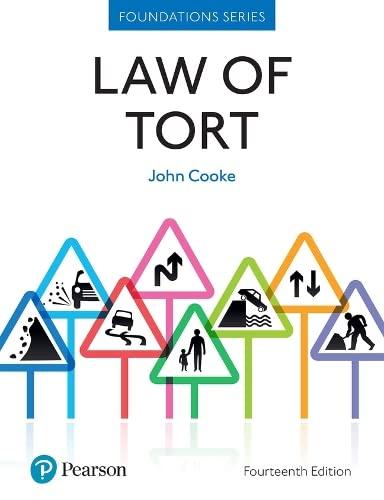Question
Veronica V.S. Acton : James Acton was in seventh grade and an aspiring football player for his school in Oregon. The school required drug tests
Veronica V.S. Acton :
James Acton was in seventh grade and an aspiring football player for his school in Oregon. The school required drug tests at the beginning of the season and randomly throughout for all student athletes. James's parents would not consent to the testing because they said there was no evidence their son used drugs or alcohol. Because he would not participate in the testing, the school would not allow James to participate in sports. With his parents, he sued the school district for violating his rights under the Fourth Amendment. Their argument was that conducting the drug tests without legitimate suspicion of a problem was an unreasonable search.
Once again, the Supreme Court ruled on the side of the school district. Drugs had been an increasing problem in the area, especially among its student athletes. The school instituted the drug testing policy along with prevention programs to try to deter drug use.
New jersey V.S. TLO : A ninth grade student in New Jersey was smoking in a school bathroom when a teacher discovered her. The school principal questioned her and, with her permission, examined her purse. She had cigarettes, rolling papers, and marijuana in her purse. Police arrested the 14-year-old, who admitted to selling drugs at school. The court found her guilty of marijuana possession and sentenced her to probation. T.L.O. appealed because she thought the search of her purse was a violation of her rights under the Fourth Amendment.
The Supreme Court did not agree, finding that the school's search of her purse was reasonable. It ruled that students do have some right to privacy, but schools have a responsibility to maintain order and an effective learning environment. Since the student was found smoking, in violation of school rules, the court said this was reasonable suspicion. It ruled her actions to be sufficient cause for school officials to search her purse.
Thus, schools may search a student's property when there is "reasonable suspicion" the student has
- broken a school rule
- committed a crime
- been in the process of committing a crime
- brief summary of theNew Jersey v. T.L.O.andVernonia v. Actoncases.
- How are the cases similar to each other? In other words, why would the earlier case be a precedent in the decision for the other?
- What are the main arguments for each side in the Vernonia v. Acton case? What details does each side use to support their opinion?
- Which side in the Vernonia v. Acton case had the stronger argument and why? (It's okay to choose either side. You will not be graded on your opinion, but rather on how well you support it with facts. Remember that even Supreme Court justices do not always agree!)
Step by Step Solution
There are 3 Steps involved in it
Step: 1

Get Instant Access to Expert-Tailored Solutions
See step-by-step solutions with expert insights and AI powered tools for academic success
Step: 2

Step: 3

Ace Your Homework with AI
Get the answers you need in no time with our AI-driven, step-by-step assistance
Get Started


